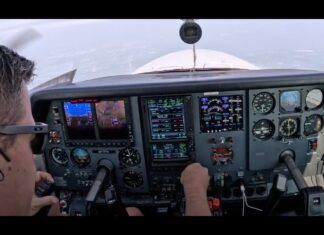While conducting the extensive research into aging pilots and insurance for this article, I came to realize that, inherent in the aging pilot insurance issues, is the need to talk frankly about the elephant on the flight deck—how does a pilot recognize that it’s time to stop flying as pilot in command?
Everyone is aware that when the FAA moved the retirement age for airline pilots from 60 to 65 the result wasn’t aluminum rain. The extraordinary airline accident rate remained extraordinary. In the meantime, a lot of airline pilots who hit age 65 kept flying professionally, either under Part 135 of the FARs or for the Part 91 fractional ownership organizations. Those operators were happy as clams to get highly experienced pilots—some of whom are flying in their 80s—and their miniscule accident rate remained miniscule. Accordingly, age is only one variable in the equation entitled “can I keep flying any longer?”
Dr. Brent Blue, a senior aviation medical examiner, talked with me extensively regarding the medical approach to the end-of-flight decision. He points out that wisdom and experience acquired with age go a long way to offset the diminished reaction and processing time that also come with age. Yet it can be the little things that bite an aging pilot, such as not accounting for the more powerful effects of fatigue, dehydration, insufficient or inappropriate nourishment and poor night vision.
Dr. Blue talked about some of the indications he sees when pilots are losing a step and need to consider either restricting their flights to day VFR in nosewheel airplanes on relatively calm days or hanging up the helmet and goggles: More than one instance in a few months of such mistakes we used to make only once a year or so, such as taxiing out with the towbar on the nosewheel, a call from ATC noting an altitude or heading excursion, leaving the pitot cover on, taxiing out with a cabin door open or wandering into airspace where we shouldn’t be.
Our talks prompted me to put together this sidebar from the perspective of more than 40 years of aviation law practice because I dealt with situations in which older pilots were angry because they couldn’t get insurance and pilots who should have stopped flying didn’t before they had an accident or incident that brought them to the attention of the FAA. I also counseled flying clubs dealing with aging pilots who were acting erratically.
The good news is that the vast majority of aging pilots decide to quit flying on a high note or they recognize that they are slipping, sometimes scaring themselves a few times and stop before something bad happens. After all, we pilots have been self-evaluating our health and fitness for flight for decades and we’re not stupid—so most of us knot the tiedown ropes and walk away for the last time at the right time.
Where is gets unpleasant is when the pilot makes a rather public mistake or has an accident that causes the FAA inspector looking at the event to question if the pilot still has the right stuff to be flying and calls the pilot in for what is called a “709 ride.” That’s shorthand for a federal law, 49 USC Section 44709, that allows the FAA to reinspect a pilot to determine if she or he meets the requirements of the pilot certificate(s) held by the pilot. Failing (you usually get two tries) means loss of your pilot certificate.
That’s often where I would come in—an aging pilot in the FAA’s crosshairs would call, scared and upset.
With that as background, and from my perspective as an attorney, if you are determined to keep flying no matter what, here are the red warning flags for pilots that I’ve most commonly seen. I suggest that if you have at least two of them that now is a good time to quit flying and look back happily at years of enjoyment in the sky.
You are over 65 and:
• You have an incident or accident.
• The FAA requires that you take a 709 ride.
• You can’t complete a flight review after three attempts.
• You’re taking meds that you haven’t disclosed to the FAA and/or are on the FAA’s do not fly list.
• Your friends will no longer fly with you.
• A CFI expresses concern about your flying.
• You have great difficulty getting insurance.
• An FAA inspector calls you up and expresses concern about your flying.
• Your friends or family stage an intervention.
If any of those or similar events happen and you react by getting angry and feeling that people are out to get you, things aren’t good. At that point, your judgment may have eroded to the point that, if you can’t get it together and stop flying, others will take action to stop you. It will be incredibly unpleasant.
That’s not the way to close out years of delight in the sky. —Rick Durden


